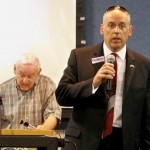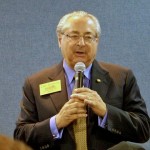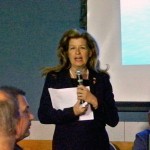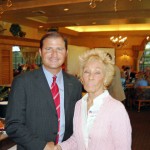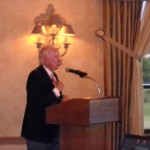Fire Rescue Sales Tax Debate
This afternoon at the South County Civic Center the Voter’s Coalition of Palm Beach County hosted a public meeting on the topic of the proposed 1% additional county sales tax to provide an independent funding source for Fire/Rescue operations.
Chaired by Voter’s Coalition President Bob Newmark and assisted by Honorary Chairman Harold Ostrow, the meeting started with an opportunity for candidates present to have 2 minutes of remarks. There were a LOT of candidates – so many in fact that the entire first hour was taken up by their presentations. Candidates for County Judge positions, County Commission and School Board seats, Florida House and Senate, and US Congress were present, including some familiar faces to the RCPB including Joe Budd (CD19), Carl Domino (FS25), Karl Dickey (BCC district 4), Anne Lee Kanjian (School Board district 4), and Lloyd Comiter (County Court Group 7).
The pro-tax side was represented by Fire/Rescue Battalion Chief Ron Beesley, who made the case that critical services are threatened by the pressure on ad-valorem tax revenue caused by the real estate downturn. Sales taxes he said, are payed by tourists (who use the services) and not just by homeowners. The intention is for the tax to be offset by an equivalent decrease in the ad-valorem taxes currently allocated to Fire/Rescue in the county and cities.
The anti-tax side was argued by Christina Pearce and Nat Roberts representing the business community (Nat is the incoming Chairman of the Economic Council of Palm Beach County). Their argument (careful to say they oppose the tax, not the Firefighters) focuses on the abundant negatives of the proposal, including that the tax is permanent and has no limit or caps (unlike the .5% tax for school construction which sunsets this year), has incentives for increased spending, will result in 9 months of double taxation, funds an essential service with an unpredictable source of funds, and that there is no assurance in the statute or the proposal that property taxes will, in fact, be reduced.
The State Legislature gave counties the ability to fund Fire/Rescue through the sales tax (SB1000 and HB365 which passed last year), by means of a ballot referendum. To get it on the ballot requires the approval of 7 of the 12 municipalites with independent fire districts, and approval of the County Commission which will take up the issue n meetings on 5/18 and 6/8.
A key moment in the debate occurred when Nat Roberts pointed out that Fire/Rescue spending increased over 80% in the 6 years (2004-10) that call volume only went up 19-25%, much of that to salary and benefit increases. Chief Beesley countered that with the fact that much of the increased spending was cash for capital construction of new fire stations – undertaken because “the revenue was available in the boom”. One was left to ponder the question as to what would restrain their spending when or if they were to get a “booming” source of revenue – like a sales tax during an economic recovery. Seemed pretty damning.
All in all, it was an interesting exchange attended by well over 100 members and guests. Below are some pictures from the event provided by Joy Stone.
Palm Beach County Inspector General Chosen
Following two days of interviews, members of the seven-member Palm Beach County Inspector General Selection Committee have tentatively chosen the county’s first independent Inspector General (IG).
Sheryl G. Steckler was the top choice among eight finalists for the new position. She is currently the inspector general with the Florida Department of Children and Families, and is second Vice President for the National Association of Inspectors General and President for the local Chapter (Tallahassee) Association of Inspectors General.
The County Attorney’s Office will now begin negotiating a contract with Ms. Steckler which, by ordinance, will be for four years.
Click HERE for the county press release.
RCPB members were involved in the creation of the county Ethics Ordinances that passed late last year. Through public comment, meetings with commissioners and staff, drafting some of the final ordinance wording that helped guarantee the independence of the office of Inspector General, and participation on the implementation committee, we fully support the process and wish Ms Steckler well in her new role if she chooses to accept it.
Background on Sheryl Steckler from the DFC website: (Click HERE.)
Appointed Inspector General in October 2002, Sheryl’s office currently consists of three units: Investigations, Internal & Single Audit and Appeal Hearings. Ms. Steckler’s oversight includes the agency’s programs and functions which extend to the agency’s outsourced community partners as well. Ms. Steckler has worked in law enforcement and related positions for over 24 years. Prior to joining the Inspectors General community in 2002, she spent eight years as the Director for Pinellas County, Florida Consumer Protection which included Mediation, Criminal Investigations and Regulatory Oversight. Ms. Steckler was also with the Florida Auditor General’s office in Performance Auditing and Public Assistance Fraud for over nine years. Ms. Steckler is currently a Certified Inspector General and Certified Inspector General Investigator. She is an Infragard member with the Federal Bureau of Investigations (Homeland Security). She is also a former certified law enforcement officer and certified welfare fraud investigator. Ms. Steckler holds a master’s degree in Public Administration and a bachelor’s degree in Criminology from Florida State University. She is currently second Vice President for the National Association of Inspectors General and President for the local Chapter (Tallahassee) Association of Inspectors General. She has held elected positions as President and Vice President of Conferences for the National Association of Consumer Agency Administrators. Ms. Steckler has also served as a member (appointed by the Florida Commissioner of Agriculture and Consumer Services) of the Florida’s Consumer Council
National Day of Prayer
National Day of Prayer
Thursday, May 6, 2010
“If My people, which are called by My name, shall humble themselves, and pray, and seek My face, and turn from their wicked ways; then will I hear from heaven, and will forgive their sin, and heal their land.” II Chronicles 7:14
There are several local events planned for this occasion.
The Republican Club of the Palm Beaches has chosen to attend the gathering at
Palm Beach Atlantic University.
11:00 – 11:25AM
On the green west of Warren Library
300 Pembrook Place, West Palm Beach
(one block south of Okeechobee Blvd. on Olive Ave.)
The theme for this year is “Prayer for Such a Time as This” based from Nahum 1:7, “The Lord is good, a refuge in times of trouble. He cares for those who trust HIm.”
Prayers will be given by:
PBAU President Lu Hardin
Campus Pastor Bernie Cueto
Dr. Randy Richards
Dr. Ken Mahanes
Special Music will also be included.
Please join us in observing the
National Day of Prayer this Thursday.
Action Alert! Voters' Coalition of Palm Beach County to host debate on 1% Sales Tax Increase
This was posted in the Sun-Sentinel and appeared in Sunday’s paper:
Voters Coalition hosting sales tax increase debate
> Posted by Andy Reid on April 29, 2010 06:20 PMThe Palm Beach County Voters’ Coalition on May 6 plans to host a debate over the proposed 1 percent sales tax increase to help pay for fire-rescue costs.
The Palm Beach County commission is considering allowing voters in August to decide whether to approve a “tax swap” – which calls for a 1 percent increase in the sales taxes with the money raised being used to reduce the property taxes normally designated for firefighting.
If approved, sales taxes would go up in January.
The Economic Council and firefighters union are scheduled to discuss the proposed sales tax increase at the May 6 Voters Coalition meeting.
Business leaders have raised concerns about increasing the sales tax. Firefighters support the move as a way to potentially lower property taxes and diversify fire-rescue revenue sources.
The debate begins at 1 p.m. and will be held at the South County Civic Center, located at 16700 Jog Road in Delray Beach.!
The Voters’ Coalition meeting on May 6th at 1:00 p.m. in the South County Civic Center is open to the public. No reservations nor tickets are required.
Ambassador Al Hoffman Highlights RCPB April Lunch Meeting
Starting with the premise that the Obama “Change Revolution” has more in common with the French Revolution than the American one, Ambassador Hoffman related Obama’s desire to “share the wealth” to the French concept of Equality (Liberté, égalité, fraternité). This French system, which devolved into a “tyranny of the majority” led quickly to the Napoleanic dictatorship. This is not an uncommon result of socialism when equality of result is mandated by the state. Laws, said the Ambassador, should encourage us to “harmonize with”, not “conform to” the social compact.
In the question and answer session, Ambassador Hoffman was asked about the problems of dealing with the liberal media, and this led to a general discussion that focused on the Palm Beach Post, particularly since a reporter for that organization was present. Sid Dinerstein suggested that the Post was worse than the media in general because rather than being simply biased, the Post goes out of their way to disparage conservatives in an overtly hostile way. The reporter responded along the lines that if you get all your news from Glenn Beck you are intellectually challenged. There was at this point a general show of support for Glenn Beck in the room.
After this interesting exchange, a number of candidates in attendance spoke to the group, including Sharon Merchant (FL Senate district 27), Mike Lameyer (also district 27), Steven Rosenblum (House district 89), and Nancy Cardone (House district 83) who gave a spirited discussion of the coming dénouement following Governor Crist’s decision to abandon his friends and supporters in the Republican Party. Javier Manjarres of the “Shark Tank”, CRA, and a past RCPB speaker, spoke for Marco Rubio, and the latest challenger for Debbie Wasserman-Schultz seat, Brian Reilly (Congressional District 20). Ralph Eltringham spoke for Colonel Allen West and Carol Hurst spoke for Francisco Rodriguez (FL House district 83).
159 New Healthcare Boards and Commissions
The following is courtesy of Congressman Lee Terry of Nebraska that was published in March. Recommended for posting by Anita Mitchell and Barkley Henderson.
Today President Obama signed a government takeover of health care into law. Below is a list of new boards and commissions created in the bill.
1. Grant program for consumer assistance offices (Section 1002, p. 37)
2. Grant program for states to monitor premium increases (Section 1003, p. 42)
3. Committee to review administrative simplification standards (Section 1104, p. 71)
4. Demonstration program for state wellness programs (Section 1201, p. 93)
5. Grant program to establish state Exchanges (Section 1311(a), p. 130)
6. State American Health Benefit Exchanges (Section 1311(b), p. 131)
7. Exchange grants to establish consumer navigator programs (Section 1311(i), p. 150)
8. Grant program for state cooperatives (Section 1322, p. 169)
9. Advisory board for state cooperatives (Section 1322(b)(3), p. 173)
10. Private purchasing council for state cooperatives (Section 1322(d), p. 177)
11. State basic health plan programs (Section 1331, p. 201)
12. State-based reinsurance program (Section 1341, p. 226)
13. Program of risk corridors for individual and small group markets (Section 1342, p. 233)
14. Program to determine eligibility for Exchange participation (Section 1411, p. 267)
15. Program for advance determination of tax credit eligibility (Section 1412, p. 288)
16. Grant program to implement health IT enrollment standards (Section 1561, p. 370)
17. Federal Coordinated Health Care Office for dual eligible beneficiaries (Section 2602, p. 512)
18. Medicaid quality measurement program (Section 2701, p. 518)
19. Medicaid health home program for people with chronic conditions, and grants for planning same (Section 2703, p. 524)
20. Medicaid demonstration project to evaluate bundled payments (Section 2704, p. 532)
21. Medicaid demonstration project for global payment system (Section 2705, p. 536)
22. Medicaid demonstration project for accountable care organizations (Section 2706, p. 538)
23. Medicaid demonstration project for emergency psychiatric care (Section 2707, p. 540)
24. Grant program for delivery of services to individuals with postpartum depression (Section 2952(b), p. 591)
25. State allotments for grants to promote personal responsibility education programs (Section 2953, p. 596)
26. Medicare value-based purchasing program (Section 3001(a), p. 613)
27. Medicare value-based purchasing demonstration program for critical access hospitals (Section 3001(b), p. 637)
28. Medicare value-based purchasing program for skilled nursing facilities (Section 3006(a), p. 666)
29. Medicare value-based purchasing program for home health agencies (Section 3006(b), p. 668)
30. Interagency Working Group on Health Care Quality (Section 3012, p. 688)
31. Grant program to develop health care quality measures (Section 3013, p. 693)
32. Center for Medicare and Medicaid Innovation (Section 3021, p. 712)
33. Medicare shared savings program (Section 3022, p. 728)
34. Medicare pilot program on payment bundling (Section 3023, p. 739)
35. Independence at home medical practice demonstration program (Section 3024, p. 752)
36. Program for use of patient safety organizations to reduce hospital readmission rates (Section 3025(b), p. 775)
37. Community-based care transitions program (Section 3026, p. 776)
38. Demonstration project for payment of complex diagnostic laboratory tests (Section 3113, p. 800)
39. Medicare hospice concurrent care demonstration project (Section 3140, p. 850)
40. Independent Payment Advisory Board (Section 3403, p. 982)
41. Consumer Advisory Council for Independent Payment Advisory Board (Section 3403, p. 1027)
42. Grant program for technical assistance to providers implementing health quality practices (Section 3501, p. 1043)
43. Grant program to establish interdisciplinary health teams (Section 3502, p. 1048)
44. Grant program to implement medication therapy management (Section 3503, p. 1055)
45. Grant program to support emergency care pilot programs (Section 3504, p. 1061)
46. Grant program to promote universal access to trauma services (Section 3505(b), p. 1081)
47. Grant program to develop and promote shared decision-making aids (Section 3506, p. 1088)
48. Grant program to support implementation of shared decision-making (Section 3506, p. 1091)
49. Grant program to integrate quality improvement in clinical education (Section 3508, p. 1095)
50. Health and Human Services Coordinating Committee on Women’s Health (Section 3509(a), p. 1098)
51. Centers for Disease Control Office of Women’s Health (Section 3509(b), p. 1102)
52. Agency for Healthcare Research and Quality Office of Women’s Health (Section 3509(e), p. 1105)
53. Health Resources and Services Administration Office of Women’s Health (Section 3509(f), p. 1106)
54. Food and Drug Administration Office of Women’s Health (Section 3509(g), p. 1109)
55. National Prevention, Health Promotion, and Public Health Council (Section 4001, p. 1114)
56. Advisory Group on Prevention, Health Promotion, and Integrative and Public Health (Section 4001(f), p. 1117)
57. Prevention and Public Health Fund (Section 4002, p. 1121)
58. Community Preventive Services Task Force (Section 4003(b), p. 1126)
59. Grant program to support school-based health centers (Section 4101, p. 1135)
60. Grant program to promote research-based dental caries disease management (Section 4102, p. 1147)
61. Grant program for States to prevent chronic disease in Medicaid beneficiaries (Section 4108, p. 1174)
62. Community transformation grants (Section 4201, p. 1182)
63. Grant program to provide public health interventions (Section 4202, p. 1188)
64. Demonstration program of grants to improve child immunization rates (Section 4204(b), p. 1200)
65. Pilot program for risk-factor assessments provided through community health centers (Section 4206, p. 1215)
66. Grant program to increase epidemiology and laboratory capacity (Section 4304, p. 1233)
67. Interagency Pain Research Coordinating Committee (Section 4305, p. 1238)
68. National Health Care Workforce Commission (Section 5101, p. 1256)
69. Grant program to plan health care workforce development activities (Section 5102(c), p. 1275)
70. Grant program to implement health care workforce development activities (Section 5102(d), p. 1279)
71. Pediatric specialty loan repayment program (Section 5203, p. 1295)
72. Public Health Workforce Loan Repayment Program (Section 5204, p. 1300)
73. Allied Health Loan Forgiveness Program (Section 5205, p. 1305)
74. Grant program to provide mid-career training for health professionals (Section 5206, p. 1307)
75. Grant program to fund nurse-managed health clinics (Section 5208, p. 1310)
76. Grant program to support primary care training programs (Section 5301, p. 1315)
77. Grant program to fund training for direct care workers (Section 5302, p. 1322)
78. Grant program to develop dental training programs (Section 5303, p. 1325)
79. Demonstration program to increase access to dental health care in underserved communities (Section 5304, p. 1331)
80. Grant program to promote geriatric education centers (Section 5305, p. 1334)
81. Grant program to promote health professionals entering geriatrics (Section 5305, p. 1339)
82. Grant program to promote training in mental and behavioral health (Section 5306, p. 1344)
83. Grant program to promote nurse retention programs (Section 5309, p. 1354)
84. Student loan forgiveness for nursing school faculty (Section 5311(b), p. 1360)
85. Grant program to promote positive health behaviors and outcomes (Section 5313, p. 1364)
86. Public Health Sciences Track for medical students (Section 5315, p. 1372)
87. Primary Care Extension Program to educate providers (Section 5405, p. 1404)
88. Grant program for demonstration projects to address health workforce shortage needs (Section 5507, p. 1442)
89. Grant program for demonstration projects to develop training programs for home health aides (Section 5507, p. 1447)
90. Grant program to establish new primary care residency programs (Section 5508(a), p. 1458)
91. Program of payments to teaching health centers that sponsor medical residency training (Section 5508(c), p. 1462)
92. Graduate nurse education demonstration program (Section 5509, p. 1472)
93. Grant program to establish demonstration projects for community-based mental health settings (Section 5604, p. 1486)
94. Commission on Key National Indicators (Section 5605, p. 1489)
95. Quality assurance and performance improvement program for skilled nursing facilities (Section 6102, p. 1554)
96. Special focus facility program for skilled nursing facilities (Section 6103(a)(3), p. 1561)
97. Special focus facility program for nursing facilities (Section 6103(b)(3), p. 1568)
98. National independent monitor pilot program for skilled nursing facilities and nursing facilities (Section 6112, p. 1589)
99. Demonstration projects for nursing facilities involved in the culture change movement (Section 6114, p. 1597)
100. Patient-Centered Outcomes Research Institute (Section 6301, p. 1619)
101. Standing methodology committee for Patient-Centered Outcomes Research Institute (Section 6301, p. 1629)
102. Board of Governors for Patient-Centered Outcomes Research Institute (Section 6301, p. 1638)
103. Patient-Centered Outcomes Research Trust Fund (Section 6301(e), p. 1656)
104. Elder Justice Coordinating Council (Section 6703, p. 1773)
105. Advisory Board on Elder Abuse, Neglect, and Exploitation (Section 6703, p. 1776)
106. Grant program to create elder abuse forensic centers (Section 6703, p. 1783)
107. Grant program to promote continuing education for long-term care staffers (Section 6703, p. 1787)
108. Grant program to improve management practices and training (Section 6703, p. 1788)
109. Grant program to subsidize costs of electronic health records (Section 6703, p. 1791)
110. Grant program to promote adult protective services (Section 6703, p. 1796)
111. Grant program to conduct elder abuse detection and prevention (Section 6703, p. 1798)
112. Grant program to support long-term care ombudsmen (Section 6703, p. 1800)
113. National Training Institute for long-term care surveyors (Section 6703, p. 1806)
114. Grant program to fund State surveys of long-term care residences (Section 6703, p. 1809)
115. CLASS Independence Fund (Section 8002, p. 1926)
116. CLASS Independence Fund Board of Trustees (Section 8002, p. 1927)
117. CLASS Independence Advisory Council (Section 8002, p. 1931)
118. Personal Care Attendants Workforce Advisory Panel (Section 8002(c), p. 1938)
119. Multi-state health plans offered by Office of Personnel Management (Section 10104(p), p. 2086)
120. Advisory board for multi-state health plans (Section 10104(p), p. 2094)
121. Pregnancy Assistance Fund (Section 10212, p. 2164)
122. Value-based purchasing program for ambulatory surgical centers (Section 10301, p. 2176)
123. Demonstration project for payment adjustments to home health services (Section 10315, p. 2200)
124. Pilot program for care of individuals in environmental emergency declaration areas (Section 10323, p. 2223)
125. Grant program to screen at-risk individuals for environmental health conditions (Section 10323(b), p. 2231)
126. Pilot programs to implement value-based purchasing (Section 10326, p. 2242)
127. Grant program to support community-based collaborative care networks (Section 10333, p. 2265)
128. Centers for Disease Control Office of Minority Health (Section 10334, p. 2272)
129. Health Resources and Services Administration Office of Minority Health (Section 10334, p. 2272)
130. Substance Abuse and Mental Health Services Administration Office of Minority Health (Section 10334, p. 2272)
131. Agency for Healthcare Research and Quality Office of Minority Health (Section 10334, p. 2272)
132. Food and Drug Administration Office of Minority Health (Section 10334, p. 2272)
133. Centers for Medicare and Medicaid Services Office of Minority Health (Section 10334, p. 2272)
134. Grant program to promote small business wellness programs (Section 10408, p. 2285)
135. Cures Acceleration Network (Section 10409, p. 2289)
136. Cures Acceleration Network Review Board (Section 10409, p. 2291)
137. Grant program for Cures Acceleration Network (Section 10409, p. 2297)
138. Grant program to promote centers of excellence for depression (Section 10410, p. 2304)
139. Advisory committee for young women’s breast health awareness education campaign (Section 10413, p. 2322)
140. Grant program to provide assistance to provide information to young women with breast cancer (Section 10413, p. 2326)
141. Interagency Access to Health Care in Alaska Task Force (Section 10501, p. 2329)
142. Grant program to train nurse practitioners as primary care providers (Section 10501(e), p. 2332)
143. Grant program for community-based diabetes prevention (Section 10501(g), p. 2337)
144. Grant program for providers who treat a high percentage of medically underserved populations (Section 10501(k), p. 2343)
145. Grant program to recruit students to practice in underserved communities (Section 10501(l), p. 2344)
146. Community Health Center Fund (Section 10503, p. 2355)
147. Demonstration project to provide access to health care for the uninsured at reduced fees (Section 10504, p. 2357)
148. Demonstration program to explore alternatives to tort litigation (Section 10607, p. 2369)
149. Indian Health demonstration program for chronic shortages of health professionals (S. 1790, Section 112, p. 24)*
150. Office of Indian Men’s Health (S. 1790, Section 136, p. 71)*
151. Indian Country modular component facilities demonstration program (S. 1790, Section 146, p. 108)*
152. Indian mobile health stations demonstration program (S. 1790, Section 147, p. 111)*
153. Office of Direct Service Tribes (S. 1790, Section 172, p. 151)*
154. Indian Health Service mental health technician training program (S. 1790, Section 181, p. 173)*
155. Indian Health Service program for treatment of child sexual abuse victims (S. 1790, Section 181, p. 192)*
156. Indian Health Service program for treatment of domestic violence and sexual abuse (S. 1790, Section 181, p. 194)*
157. Indian youth telemental health demonstration project (S. 1790, Section 181, p. 204)*
158. Indian youth life skills demonstration project (S. 1790, Section 181, p. 220)*
159. Indian Health Service Director of HIV/AIDS Prevention and Treatment (S. 1790, Section 199B, p. 258)*
*Section 10221, page 2173 of H.R. 3590 deems that S. 1790 shall be deemed as passed with certain amendments.
Palm Beach County Commission Proposes Sales Tax Increase
The County Commission, by a 5-2 vote, is proposing to place on the ballot in August, a 1% sales tax increase to fund Fire/Rescue outside of the normal budget process. If passed, it would become effective at the end of the year when a .5% school infrastructure tax ends, thus the new rate would be 7%.
Unlike the school infrastructure tax, this one would not have an end date, and would eliminate the need for Fire/Rescue to participate in the normal county budget process every year. In effect, it would provide a steadily increasing revenue stream that would be earmarked for Fire/Rescue only, and would be collected regardless of budget needs. It should be noted in this context, that in the period 2004-2010, the Fire/Rescue call rate went up 19% (24% if you adjust for 2004 hurricanes), while the Fire/Rescue budget went up 82%. While most would agree that Fire/Rescue is an essential service, there are a lot of things in the budget that are only incidental to responding to emergencies. If this gets on the ballot, we will be picking it apart line by line.
The tax is supposed to be “revenue neutral” – that is the county would reduce the millage so the ad-valorem taxes on real estate would decline by the amount of the sales tax increase. That sounds good (shifting taxes to consumption rather than property) but there is nothing in either the proposal or the overlying legislation (SB1000, HB365 from 2009) that requires them to do so now or in the future. How long do you suppose it would take the County Commission to find that they “need the money” and put the millage right back where it was (or higher).
A broad coalition of business and grass roots groups is coming together to fight this bad idea. The first front is on the city level -as they need the agreement of 7 of the 12 municipalities that have their own Fire/Rescue operations. It is not clear how the cities will decide it – the interlocal agreements that address revenue sharing would have to be worked out first, and you can imagine that there will be a bit of lobbying going on. If you can, call your city council and find out what they plan to do and if there is a public meeting scheduled, then post what you find here. If they can convince 7 of the cities, the rest will have to go along or lose the use of the money that their citizens are paying to the sales tax.
The second front is at the county level with two public meetings on 5/18 and 6/8, where the text of the ballot measure will be discussed. The two dissenting votes last time were Jeff Koons and Steve Abrams. Karen Marcus is the author of putting the measure on the August ballot instead of November when more people will be voting. “It is just shifting,” Commissioner Jess Santamaria said. “It is not increasing taxes… It is a way of balancing things and making it more equitable,” he said. Please prepare to attend these meetings and say whether you agree with that statement.
The third front will be the ballot measure itself (if it gets that far). With all the other issues to deal with this year, it would be a shame if this fight is added to the mix, but we must be prepared. The coalition that is coming together in opposition to this measure has created a website to make the case and provide factual context. It can be found at . Please refer to it from time to time and join us in the fight.
Allen West Takes the Lead over Ron Klein in New Poll
In a survey conducted by Wilson Research Strategies on April 18-19, Colonel Allen West leads Incumbent Ron Klein 44% – 42%.
West is now known by nearly 50% of the Congressional district and has a favorable to unfavorable ratio of 3-1 (23%-8%). Klein’s is viewed unfavorably by nearly one-third of the district (31%) and trails West even though over 90% of the voters have heard of Klein.
For the full press release from the West campaign, CLICK HERE.
The Children’s Project of Palm Beach
Have you seen the recent commercials on television or seen the ads in the paper?
The Early Childhood Initiative Foundation is spearheaded by Dave Lawrence of The Children’s Trust in Miami-Dade County. The Foundation is sponsoring The Children’s Project of Palm Beach– a feasibility study about the potential for organizing and building a politically powerful Children’s Movement of Florida, significantly shaping the State’s priorities for children.
Those priorities include:
- Access to quality health care.
- Training for parents and guidance for mentoring.
- Early screening and treatment for children who might have special needs.
- Stimulating and nurturing child care.
- High-quality pre-kindergarten.
This is a countywide outreach project to strictly educate and inform Palm Beach County residents about essential issues regarding children in order to ensure that they are prepared and ready to learn in school and able to succeed in life.
To that end Dave Lawrence at The Early Childhood Initiative Foundation http://www.teachmorelovemore.org/ECIF.asp , funded by the Kellogg Foundation www.wkkf.org , is promoting the Children’s Project of Palm Beach during April and May. The goal during these two months is to learn how media messages and grassroots organization might educate and inform the public about the need for a “movement” for children. This non-partisan effort seeks to measure the extent to which people, once informed, can actually tell us how they received new information and why it is important for children. That then gives us a better chance of prioritizing resources to benefit children and families.
RCPB is pleased to be co-hosting an event which will further our understanding of the program. The event is FREE – but reservations are REQUIRED. Please contact Bette Anne at 561-697-4911 or via email info@gopclubpb.org
The Childrens Project 5-11-10 Click Here for Invitation
Cordially invite you to a presentation about early childhood development and children’s issues: If children are our future – shouldn’t we invest more in them now?
Presented by
Roberto Martinez, Esq.
Tuesday, May 11, 2010
Meet And Greet: 5:45-6:30 p.m.
Presentation: 6:30-7:00 p.m.
Bear Lakes Country Club
1901 Village Boulevard
West Palm Beach, FL 33409
Business Attire, No Jeans Please
Cell Phones must be silenced
Light Refreshments and Beverages Provided
The Bar will be OPEN for Credit Card Purchases
SELF PARKING – No Valet Service
There is NO Fee to attend and learn more about the Children’s Project of Palm Beach County
Reservations are REQUIRED
R.S.V.P. to
(561)-697-4911
Action Alert – Contact your Senators on S.3217, Restoring American Financial Stability Act of 2010
On Monday the Senate will resume consideration of the motion to proceed to S.3217, Restoring American Financial Stability Act of 2010 . The 1400 page bill has a lot wrong with it – and it’s important to call our Senators and tell them to vote NO.
Here is an excellent article by an analyst at Heritage Foundation on 14 Fatal Flaws. I suggest you read through it prior to contacting Senators Nelson and LeMiuex with the contact information provided further down. All the points are excellent – but to me #14, without any of the other points, would make this bill a non-starter!
Senator Dodd’s Regulation Plan: 14 Fatal Flaws
Published on April 22, 2010 by James GattusoThe Senate is expected to take up a proposal, originally authored by Senator Chris Dodd (D–CT), to reform the financial regulatory system in the U.S. The goal is clear: to minimize the chances that another financial crisis—and bailouts—will arise again.
The objective is a good one. Unfortunately, the 1,408-page bill includes numerous provisions that would hurt—not help—consumers and the economy. It would even make another financial crisis or bailout more likely to occur.
Fourteen Flaws
Among other things, the bill:
1. Creates a protected class of “too big to fail” firms. Section 113 of the bill establishes a “Financial Stability Oversight Council,” charged with identifying firms that would “pose a threat to the financial security of the United States if they encounter “material financial distress.” These firms would be subject to enhanced regulation. However, such a designation would also signal to the marketplace that these firms are too important to be allowed to fail and, perversely, allow them to take on undue risk. As American Enterprise Institute scholar Peter Wallison wrote, “Designating large non-bank financial companies as too big to fail will be like creating Fannies and Freddies in every area of the economy.”[1]
2. Provides for seizure of private property without meaningful judicial review. The bill, in Section 203(b), authorizes the Secretary of the Treasury to order the seizure of any financial firm that he finds is “in danger of default” and whose failure would have “serious adverse effects on financial stability.” This determination is subject to review in the courts only on a “substantial evidence” standard of review, meaning that the seizure must be upheld if the government produces any evidence in favor of its action. This makes reversal extremely difficult.
The complete article can be found here: Senator Dodd’s Regulation Plan – 14 Fatal Flaws
The bill can be found here.
Contact our senators:
LeMieux, George S. – (R – FL) Class III
356 RUSSELL SENATE OFFICE BUILDING WASHINGTON DC 20510
(202) 224-3041
email Senator LeMieux
Nelson, Bill – (D – FL) Class I
716 HART SENATE OFFICE BUILDING WASHINGTON DC 20510
(202) 224-5274
email Senator Nelson

